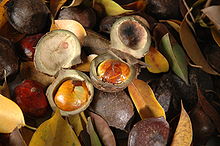Jengkol: Health Benefits and Myths You Need to Know
Uncovering the Mystery of Jengkol: Benefits, Controversy and Myths
Jengkol, a name that is familiar to Indonesian people. As a controversial food ingredient, jengkol has been a topic of debate for years. Even though jengkol has extraordinary health benefits, it is also characterized by various negative myths and stigma. This article will discuss everything about jengkol, from its origins to its benefits, as well as reveal the facts from the fiction that surrounds it.
History and Origins of Jengkol
Jengkol, or known by its scientific name Archidendron pauciflorum, is a type of tree originating from Southeast Asia, especially Indonesia and Malaysia. This plant has long been known as a food source in the area. In Indonesia, jengkol is an important part of culinary culture, especially in Java and Sumatra.
Jengkol Nutritional Composition
Jengkol contains various important nutrients that are beneficial for health. Although controversial because of its strong distinctive aroma, jengkol is actually rich in protein, fiber, complex carbohydrates, as well as vitamins and minerals such as vitamin B and calcium. The protein content in jengkol makes it a good alternative for people on a plant-based diet.
Health Benefits of Jengkol
Source of Vegetable Protein: For vegetarians and vegans, jengkol is a very nutritious source of vegetable protein.
Improves Digestive Health: The fiber in jengkol helps facilitate digestion and prevent constipation.
Maintains Bone Health: The calcium in jengkol helps strengthen bones and prevent osteoporosis.
Regulates Blood Sugar: The complex carbohydrates in jengkol help regulate blood sugar levels, making it a good food choice for diabetics.
Antioxidants: Jengkol contains antioxidants that help fight free radicals in the body, reducing the risk of degenerative diseases.
Controversy surrounding Jengkol
Despite its many health benefits, jengkol is also surrounded by controversy, especially regarding its strong distinctive aroma and the side effects it may cause. Some of these side effects include:
Strong Scent: One of the main problems often associated with jengkol is its strong aroma and can cause an unpleasant odor in sweat and urine.
Digestive Problems: Although the fiber in jengkol is beneficial for some people, for those who are not used to consuming it, jengkol can cause digestive disorders such as bloating and excessive gas.
Allergy Risk: Some people may experience an allergic reaction to jengkol, which can cause symptoms such as itching, rashes, or even shortness of breath.
Myths about Jengkol
Apart from the obvious controversy, jengkol is also surrounded by various myths spread in society. Some popular myths about jengkol include:
Infertility Myth: One of the most famous myths about jengkol is that consuming it in excess can cause infertility in men. However, there is no scientific evidence to support this claim.
Poison Myth: There is also a belief that jengkol contains poison that can be harmful to health. However, by cooking it properly, the poison can be neutralized so it is safe to consume.
Appetite-Reducing Myth: Some people believe that jengkol can eliminate appetite. Although jengkol has a distinctive taste, there is no scientific evidence to support this claim.
Tips for Consuming Jengkol Safely
For those who want to enjoy the health benefits of jengkol without experiencing unwanted side effects, here are some tips for consuming it safely:

Soak Jengkol: Before cooking, soak jengkol in water for several hours to reduce levels of phenolic acid which can cause excessive gas.
Boil Properly: Boil jengkol in boiling water for at least 2 hours to remove compounds that can cause digestive disorders.
Consume Small Portions: Start with small portions the first time you consume jengkol to see how your body reacts.
Pay Attention to Body Reaction: If you experience uncomfortable symptoms after consuming jengkol, stop using it and consult a health professional.
Conclusion
Jengkol, although controversial, is a food that is rich in nutrients and has significant health benefits. By understanding how to consume it correctly and paying attention to your body’s reactions, you can enjoy the health benefits of jengkol without experiencing unwanted side effects. While negative myths and stigma may persist, proper knowledge about jengkol can help us appreciate its value as an important part of Indonesian culinary culture.



